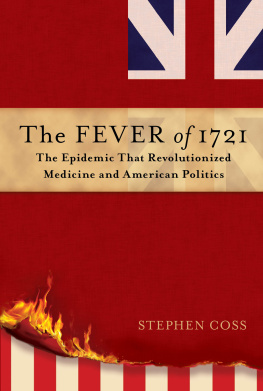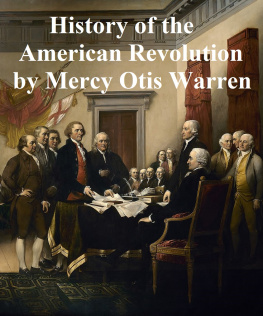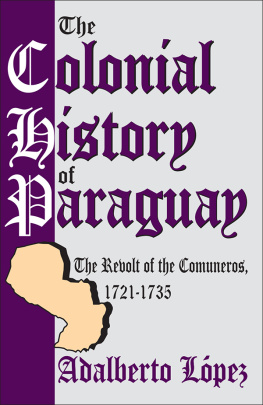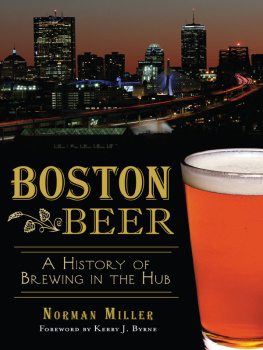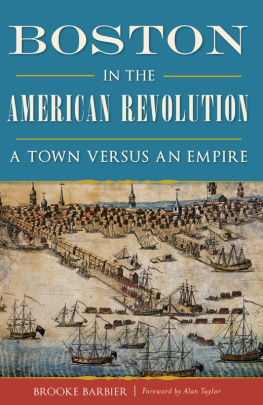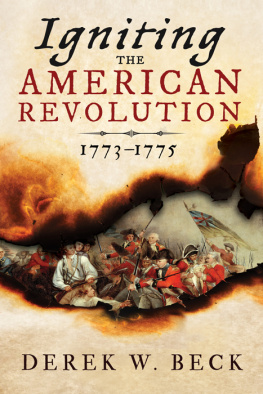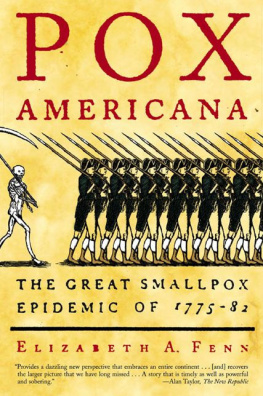ACKNOWLEDGMENTS
I n researching this book I consulted hundreds of primary sources including newspapers, pamphlets, broadsides, records of governmental proceedings in Boston and in London, letters, diaries, and maps. For access to digitized and microfilm copies of those materials, and to the scores of books and academic journals I also needed to construct this narrative, I would like to thank the staffs of the Memorial Library at the University of WisconsinMadison and the Wisconsin Historical Society.
My research took me to Boston and Rhode Island. At the Massachusetts Historical Society I had the great privilege of viewing original copies of the New-England Courant . At the Rhode Island Historical Society in Providence I found a wealth of information about James Franklin and his family post-Boston. The Newport Historical Society assisted me in locating the gravestones of James and Ann Franklin in the Common Burying Ground beside Island Cemetery. I also visited the Museum of Newport History, where the printing press James and Benjamin Franklin used to print the Courant is on display. After spending so much time reading and writing about the Franklin brothers it was a thrill to see their printing press in the flesh. My thanks to each of those fine institutions.
There is no single history of anything. Our best chance at understanding important events and persons is by way of a rigorous study of the known facts together with a kind of triangulation of complementary and disparate interpretations of those facts. For valuable perspectives on the political and social forces at work during the colonial and Revolutionary periods I am indebted to Perry Miller, Bernard Bailyn, G. B. Warden, Gary B. Nash, Gordon S. Wood, Alan Taylor, Clinton Rossiter, and John Gorham Palfrey, among others. Before Thomas Hutchinson became the final civilian royal governor of Massachusetts he wrote the first part of a perceptive and illuminating history of that colony. To read his take on the politics of the early eighteenth century is to understand the consternation with which American loyalists regarded what would prove the beginning of the end of British rule in America.
I gained much of my understanding of Western medicine in the early eighteenth century, and of the menace of infectious diseases in general and of smallpox in particular, from medical historians and biographers including John Duffy, Richard H. Shryock, Otho T. Beall Jr., Reginald M. Fitz, Whitfield J. Bell, Elizabeth A. Fenn, Henry R. Viets, and Donald R. Hopkins. Similarly, press historians Isaiah Thomas, Charles E. Clark, Clyde Augustus Duniway, William David Sloan, Julie Hedgepeth Williams, Joseph Fireoved, and Frank Luther Mott, among others, provided me with the context necessary to understand the significance of James Franklins Courant . Among the many excellent Benjamin Franklin biographies that informed this work were those by J. A. Leo Lemay, Carl Van Doren, Joyce E. Chaplin, H. W. Brands, David Waldstreicher, Claude-Anne Lopez, Eugenia W. Herbert, Albert Furtwangler, and Walter Isaacson. Arthur Bernon Tourtellots Benjamin Franklin: The Shaping of Genius, the Boston Years , offered the most detailed account of Ben Franklins apprenticeship with James and proved invaluable. Nian-Sheng Huangs biography of Josiah Franklin offered a fascinating perspective on the family. And I am no less indebted to Cotton Mathers biographers, especially Kenneth Silverman and David Levin, who managed to throw light on a man so complicated even Nathaniel Hawthorne struggled to understand him. Gerald Marvin Magers doctoral dissertation on Zabdiel Boylston remains the essential starting point for any discussion of that daring physician.
I am not the first author to address the Boston inoculation experiment of 1721. I learned from all of my predecessors, including Jennifer Lee Carrell, John B. Blake, Carolyn Garrett Cline, Ola Elizabeth Winslow, Margot Minardi, Tony Williams, and the aforementioned Gerald Mager.
Several scholars, authors, and scientists were kind enough to answer my questions by email or letter. Im grateful to the late Leo LeMay and to H. W. Brands, Elizabeth Fenn, Nian-Sheng Huang, Stephen Pemberton, Ronald L. Numbers, and D. A. Henderson, the man who led the international effort to eradicate smallpox.
Thanks to my editor, Alice Mayhew, who told me with conviction and passion what was wrong with my manuscript and what was right with it, and was correct on both counts. To say its an honor to be edited by her would be an understatement. The same goes for being published by Jonathan Karp. Eight years ago Jon was heading up another imprint when he purchased the proposal for my at-that-point unwritten book. When he left that position to become the publisher of Simon & Schuster I feared the book had lost its champion. But one day about two years later he sent me an email expressing his interest in possibly obtaining the rights to the book for S&S. I have never been more grateful for an email. Thanks, also, to assistant editor Stuart Roberts, who guided me through the process of first-time authorship; to copy editor Bob Castillo, who brought an impressive command of the material to his work; to Jackie Seow, who oversaw the jacket design; and to the rest of the publication team at Simon & Schuster.
I never would have had the temerity to begin this book without the coaxing of my good friend and fellow author James Campbell. Jim and I were having a drink at a Madison, Wisconsin, bar one evening some eight years ago when I told him Id written a rough draft of a screenplay about a smallpox epidemic in colonial America and the first widespread use of inoculation in Western medicine. He asked me to tell him more, and by the time the evening was over he was insisting that I expand the idea into a nonfiction book. Write up a short synopsis, he said. Ill pass it along to my agent. If he likes the idea, you can decide what you want to do. A few months (and a lot of work) later I had an agent and a book contract. Since then, through the several ups and downs of the journey to publication, Jim has remained the books most stalwart supporter.
Id like to thank my agent, David McCormick, who has been with me from inception of this book. David recognized something in those first few pages I sent him at Jim Campbells urging, helped and encouraged me in the writing of my proposal, and remained a partner as this book evolved, at one point providing me with a detailed vision for reshaping the narrative.
I wrote this book in many locations, but if theres one that deserves a special shout-out, its the Ground Zero coffee shop in Madison, Wisconsin.
I am grateful for the love and support I received before and during the writing of this book from my mother, Mary Coss, my late father, James Coss, and my in-laws, the late Garrett and Dee Fleming.
My biggest debt is to my wife, Judy, who over the course of the long and sometimes painful gestation of this book kept our lives functioning while, day after day, night after night, and weekend after weekend, I disappeared (literally and figuratively) to research, write, and revise. I want her and our four sons, Dylan, Kevin, Brett, and Stephen, to know how much I appreciate their patience. Its not easy for the author to explain why his book is taking so long to finish. Its a far more thankless and tedious job for his family to have to do that for him. Now that this book is published I can relieve them of that burden. My hope is that everyone who wondered why it was so long in the making will find a satisfying and compelling answer in these pages.

JUDY FLEMING COSS
STEPHEN COSS lives in Madison, Wisconsin. This is his first book.

